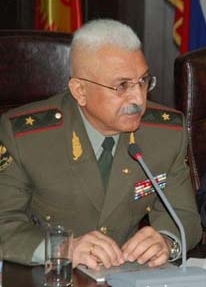Tracing the debate over the constitutional reforms in Armenia, we deemed it useful, based upon the results of three academic trips, to interview Major General Hayk Kotanjian — Head of the Institute for National Strategic Studies, Ministry of Defense, Republic of Armenia; Doctor of Political Science; Professor — about the Israeli model of the parliamentary republic in terms of effectiveness of the security policy.
Dear General, in your opinion, what is the similarity of the lessons learned by the Armenian and Jewish peoples from the national catastrophes they went through in the 20th century?
Notwithstanding the remarkable unique identity of these two ancient players in shaping civilization systems in West Asia and the Middle East, to my mind, they share political lessons learned from national catastrophes having experienced during the two World Wars of the 20th century — the Armenian Genocide in the Ottoman Empire and the Genocide-Holocaust of the Jews of Europe. Both peoples responded to the national catastrophes following the World Wars having driven them to the verge of total annihilation, with the revival of the culture of their ancient millennia-old statehood and creation of independent nation states – the Republic of Armenia and the State of Israel. Another important feature of similarities of these two re-established nation states is that the Republic of Armenia in 1918 and the State of Israel in 1948 were proclaimed parliamentary republics.
Dear Professor, how would you assess the current threats to the national security of Israel and the effectiveness of the parliamentary model of government in terms of guaranteed political security and sustainable development of the State of Israel?
Read also
Security threats to the State of Israel are not inferior to the level of security threats to the Republic of Armenia: the majority of Islamic countries consider the existence of Israel to be illegal (only Egypt and Jordan recognized Israel) and overtly express the need to eliminate it. Their policy and the activities of non-state actors of radical Islam manipulated by them pose external and internal threats to the existence of the State of Israel. The legitimacy of the State of Israel is called into question by the radicals of Orthodox Judaism as well (the Lord is the only Leader, and no one else can exercise power over the Jewish people).
Political and security analysts of Israel single out three components of strategic vulnerability causing existential threat to Israel, which are taken as a given in the National Security Strategy of the state: 1. Huge demographic advantage of the Arab (Islamic) countries; 2. Vulnerability of borders for lack of strategic depth (width of the territory of Israel in certain areas does not exceed fifteen kilometers); 3. Necessity to deter the enemy in a hard protracted conflict that requires investments of huge resources for defense needs (1947-1949 — Israel’s War of Independence, 1956 — Suez Crisis; 1967 — Six-Day War, 1967-1970 — War of Attrition, 1973 — Yom Kippur War, 1982-2000 — First Lebanon War, 1991 — Israel’s participation in the Gulf War, 2006 — Second Lebanon War, 2008-2009 — Operation Cast Lead (Gaza War)).
The toolkit for resolving internal political conflicts, as well as successfully countering external threats in the Israeli model of parliamentarism has proved to be effective over 67 years: with the duration of the cadence of the Knesset for 4 years, the average length of activity of the convocation of the Parliament over the years of Israel’s existence is quite high and is 3.5 years. In this case, the reason of productivity of political crises management lies in the consistency of Israeli parliamentary model reflecting the strategic interests of national security and sustainable development of the Jewish people both in Israel and in the system of World Jewry as a whole.
Dear Professor, as a political scientist and researcher in the field of political institutes and processes of national security, could you briefly present the essence of the parliamentary model of governance in Israel regarding the effectiveness of key actors and processes of making and implementing decisions of national scale?
First of all, it should be noted that, in response to the Genocide-Holocaust, the Founding Fathers of the State of Israel, resting upon the resolution of the UN Security Council, shared the conviction that in order for the Jewish state to become a safe heaven and beacon for the progressive and sustainable development both for the Jews living on the land of the Zion, and the World Jewry as a whole, the State of Israel ought to be created as an effective democracy. And now the State of Israel in practice is the only effective democracy in the Greater Middle East, as well as a beacon of sustainable democratic development for the entire World Jewry.
The political role of a nonpartisan President, who is elected by the Parliament—the Knesset, and takes the ceremonial and protocol role as the Head of the state, and is also endowed with strategically important political powers, is of exceptional importance in this parliamentary model. From the elected members of the Parliament he nominates the candidate for the Prime Minister mandated to negotiate with parliamentary parties for the formation of the government.
The Prime Minister of Israel—after the Parliament approves his Government—becomes the state center of guaranteeing the national security and sustainable development of the State of Israel. Receiving the proposal by the President, before the approval of the Cabinet he holds consultations with the parties which may support his Government, and clarifies their requirements both on political matters, and concerning the appointments in the ministries and other agencies. After the consultations with the parties, the Coalition structure and its program, as a range of coordinated guidelines making up the political strategy of the Coalition, are developed.
Based upon the negotiations between the Prime Minister and the Coalition parties, the decision on distributing the ministerial posts in the Government is made. The tool for distributing the ministerial posts serves the “ministerial key”, i.e., the co-relation of the overall number of members of the parliament factions supporting the Prime Minister, to the number of ministers in the Government. The number of ministerial portfolios which every faction is to receive is decided by a number of members of that faction in the Knesset, divided by the “key”. The problem of “remainders” is solved via the appointment of deputy ministers and other officials. It is noteworthy that, given the fact that the majority of ministers and all deputy ministers are members of the Parliament, provides the Prime Minister with an additional resource in support of his policy and influence of the Cabinet upon passing the parliamentary decisions, especially in furthering the legislative initiatives by the Government. In the Israeli Government the post of the Vice-Premier is also available, and holding of more than one office is also possible.
Dear Professor, what are the specifics of Israel in terms of ensuring the legitimacy of the Government and the activity of its members in the Knesset at the parliamentary model of governance?
The election of the Prime Minister and the ministers from among the members of the Parliament asserts the legitimacy of not only the Premier, but also the Government at large. After being approved by the Knesset the ministers receive the vote of confidence both from “below” — the mass support, and from “above” — the Parliament, the elite support. After consultations—on adequate grounds—the candidate for minister’s post if necessary may be nominated also a non-member of the Parliament (usually an influential specialist). The minister from among the Knesset members has limitations in his parliamentary activity: he may not make parliamentary inquiries, introduce his bills as an MP, cast a vote of no confidence in the government, be a member of Knesset committees. Sometimes a minister upon taking office renounces his parliamentary mandate; while his party (the Coalition) does not lose his seat—it is taken by the next person in the party list.
Unlike the practice in other states, the Deputy Minister in Israel is a political figure. In particular, according to the law, he must be a member of the Knesset (we would remind you that such a strict requirement doesn’t apply to the Minister), and he is also responsible for ensuring the liaison between the Ministry and the Knesset. The appointment and the dismissal of the Deputy Minister is not the Minister’s but the Premier’s prerogative (however, the Minister’s consent in this case is also obligatory). The Government reports on this to the Knesset, nevertheless the Parliament’s permission is not required. It should be noted that the above-mentioned parliamentary restrictions concerning the ministers, also apply to the deputy ministers.
Dear General, please briefly present the place and role of the National Security Council (NSC) in the system of parliamentary governance of the State of Israel.
The NSC of the State of Israel is a special tool of the Government’s power carrying out the development and coordination of interagency policy aimed at ensuring the national security and sustainable development of Israel. The coordinator of the activities of this special body, chaired by the Prime Minister, is the Secretary of NSC, who is appointed from among nonpartisan highly qualified specialists, and whose activities shall not be made public.
The interagency policy of national security, developed by the NSC chaired by the Israeli Prime Minister on strategic issues of foreign policy and security, is promptly carried out by the Prime Minister through the Security Cabinet (Narrow/Kitchen Cabinet) endowed with the necessary powers and resources.
Dr. Kotanjian, how do you view the use of the Israeli model and experience in the preparation and discussion of the draft of the Constitution of the Republic of Armenia as the basis of the constitutional reform with the transition to a parliamentary model of state governance?
Indeed, the uncritical copying of Israel’s experience would be wrong, and the State Commission on the drafting of the Constitution did not allow it. As an example of the specificity of the Israeli experience we can note that the parliamentary model of governance in Israel successfully operates without any Constitution in the State of Israel. The legal regulation of the system of the government and the political activity of public institutions is carried out according to the system of Basic Laws.
Using the lessons of the guaranteed provision of the national security in the parliamentary model of Israel under the concentration of power (powers of the government-administration and resources) in the hands of the Prime Minister—the head of the ruling inter-party Coalition – (with a restricted role of the nonpartisan President with ceremonial and protocol functions) requires a pragmatic calculation — with a sober view of specificity of the political culture of the Republic of Armenia.
Dear Professor Kotanjian, what would you like to note as a conclusion?
In conclusion, I would like to mention the real democratic character of the parliamentary model of governance in Israel, at the origins of the State of Israel aimed at the development of political party system in the proportional elections to the Parliament with a low threshold for parties to the supreme representative body of power. Israeli politicians and experts themselves do not consider the experience ideal. Skillfully using the tools of public and confidential criticism, they work to identify shortcomings and overcome them. The democracy of the parliamentary model of the government in Israel is characterized by high political culture of pluralism and party competitiveness with continuous criticism, identification of flaws, and lessons learned from them for the improvement of the democratic Jewish state.
And of course, it should be emphasized that the people of Israel, being aware of its responsibility as a main source of power and using the tools of effective democracy, have the opportunity to do whatever is necessary within the limits of the guaranteed rights and freedoms, as well as civil liabilities to the State of Israel, that in its Parliament—the Knesset and then in the Government the most worthy representatives were elected.






















































